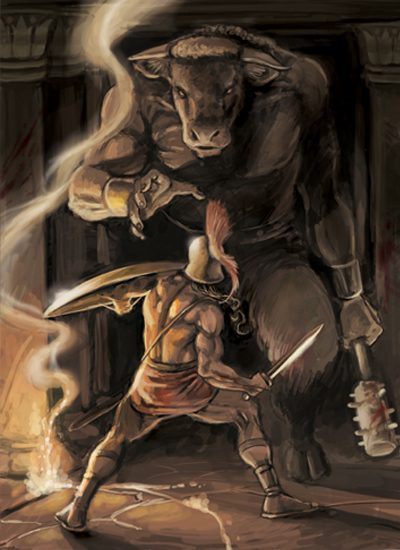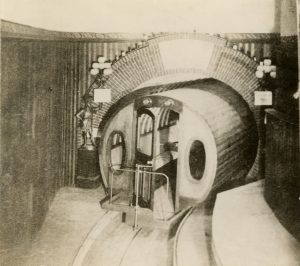Theseus was a Greek hero and was the son of Aethra, princess of Troezen, and daughter of king Troezen. His father was Aegeus, the king of Athens, though there are stories that say that Poseidon, the god of the sea, was Theseus’s father. Theseus was brought up by his grandfather and lived in Troezen, but at the age of only sixteen, he went to Athens and claimed his father, who he believed was Aegeus. Throughout the journey, Theseus killed many others; however, his greatest victory was still yet to come. He eventually encountered the Minotaur, who was a monster that was half human and half bull.1

The Minotaur was son of Pasiphae, queen of Crete and wife of King Minos of Crete. Queen Pasiphae slept with a bull, which is how the Minotaur came to be. A snow-white bull had been sent to King Minos; however, when King Minos did not sacrifice the bull to Poseidon, Poseidon caused Pasiphae to fall in love with the beautiful bull.2 The product of her love was the monstrous Minotaur. This obviously made Minos upset; however, he did not want to kill the monster. He set the architect Daedalus to create and build a labyrinth that made it impossible for anyone to get out without the help of someone else.3
In the labyrinth, the Minotaur was fed young humans, along with several of Minos’ enemies. These humans were victims of Minos, who were forcibly sent by Athens as tribute. Every year, Minos would have seven boys and seven girls sent to the labyrinth, and each year none of the several tributes would return. Once in Crete, they were devoured by the monster-like, blood-thirsty Minotaur. One day, Theseus decided that he would be the one to finally come back out of the labyrinth and end this practice. He, unlike others, volunteered himself as one of the victims. Theseus and the other several hostages sailed for Crete. When Theseus arrived in Crete, he was greeted as the doomed by several locals, and among the crowd was Ariadne, the daughter of King Minos, who immediately fell in love with Theseus and came up with a plan to help him defeat the Minotaur. She gave Theseus a ball of thread that he would fastened to the door of the maze in the labyrinth and unwind the ball until he reached the Minotaur.4

As Theseus and the other victims entered the labyrinth, the Minotaur was sleeping. He immediately took action and wasted no time in trying to defeat the creature. Theseus had absolutely no weapons, not even a sword. He fought the Minotaur hand-to-hand and succeeded, with his very own bare hands, beating the repulsive creature to death with just one blow from the fist. He then helped the other hostages who were in the labyrinth to safety, using the thread to find his way out. After defeating the Minotaur, Theseus and several other Athenians sailed back to Athens, taking along Ariadne. Though Theseus took Ariadne along with him to Athens, he eventually abandoned her on an island.5
On the way back to Athens, Theseus made a promise to his father that he would change the color of his sails if victory was his. Black meant that he had not made it back and white meant that he had; however, Theseus forgot to do so, causing his father to kill himself out of grief. When Theseus’ father died, he became the king of the city-states of Athens. He was honored for his victories and for his win over the Minotaur. He was also honored for making the kingdom larger.6
- Ancient Greece and Rome: An Encyclopedia for Students, 1998, s.v. “Theseus and the Minotaur,” Carroll Moulton. ↵
- Funk & Wagnalls New World Encyclopedia, 2016, s.v. “Minotaur.” ↵
- UXL Encyclopedia of World Mythology, 2009, s.v. “Theseus.” ↵
- The Greenhaven Encyclopedia of Greek and Roman Mythology, 2002, s.v. “Theseus in the Labyrinth,” by Don Nardo. ↵
- Ancient Greece and Rome : An Encyclopedia for Students, 1998, s.v. “Theseus and The Minotaur,” Carroll Moulton. ↵
- UXL Encyclopedia of World Mythology, 2009, s.v. “Theseus.” ↵



41 comments
Madelynn Vasquez
Being a nerd for Greek mythology and having read this was amazing! I felt like I was discovering Greek mythology all over again as this wasn’t a story I was too familiar with! Understanding that a lot of Greek mythology stems from wanting to give some life lesson or have some symbolism to them is prominent in this story of Theseus and the Minotaur!
Nathan Castillo
Having already read a bit of Greek mythology, the articles on here really help me understand more of the stories that some other sources so not usually touch on. I have heard of the Minotaur and how he came to be, but the story involving Theseus was new to me and I really enjoyed more of story to it. I love hearing how God’s mettle with mortals on how they can punish or reward mortals through strengths and/or curses. By far one of my favorite topics.
Kristina Tijerina
This is so fascinating because Theseus was just another regular human that went into the labyrinth. Everybody who had previously been sent into the labyrinth had never made it out, but Theseus had the intent of killing the Minotaur and going back home to safety. He did have some minor help from Ariadne, who sent him with a ball of thread so that he could find his way out of the labyrinth to safety, but the main point is that he fought the minotaur with his bare hands. Theseus fought successfully and made it out to safety along with the others who were sent into the labyrinth. It’s really unfortunate though that Ariadne was in love with Theseus and he just ended up abandoning her.
Amelia Hew
I’m speechless when the article wrote that the Minotaur was defeated by Theseus in a hand to hand combat despite Theseus being a mere human. Theseus, despite being the hero that ended the practice of sacrificing young children to the Minotaur was the one who abandoned Princess Ariadne on an island after she helped him to make his way out of the maze and also the one who cause his father’s death since he forgot to change the color of his sail, leading to his father believing him dead and died of grief. Anyways, Greek mythology is still very fascinating to read and I absolutely love the stories.
Arturo Canchola
Growing up with author Rick Riordan being one of my favorites, I became quickly acquainted with Grecian mythology as a kid and was fascinated by it. Even with all the stories I’ve learned of, I didn’t quite remember this myth specifically. Theseus striking down the Minotaur with nothing else but his bare fists is a testament to his power, as he freed the people of the labyrinth. Even though this myth is new to me, there are recurring themes shared by other heroes in Greek mythology: valor, victory and tragedy.
Emmanuel Ewuzie
The unnecessary and accidental deaths are a common theme in Greek mythology. Death, in general, is a frequent occurrence in Greek mythology. In this case, Theseus’s father died from a suicide. In Greek Mythology, if someone does something shameful or dishonorable, most of the times, they kill themselves or at very least, cause irreversible harm to themselves. For example, Oedipus who married his mother. Once finding out he did that, he gouged out his own eyes
Todd Brauckmiller
Just like all of the other Greek myths I find these tales very exciting. A man defeating such a dangerous creature in battle with nothing but his bare hands, sounds like a dream. I love the article and hope to see more Greek myths because for me they have become a new personal favorite of mine at this point. Still it is very sad that Theseus’s father had killed himself because his own son forgot to put up the right sail. What’s really interesting was that I had no idea King Minos sacrificed young people to the Minitour, even if it is a ritual still sounds very dark.
Eric Ortega Rodriguez
This is a very fascinating article. Though I must admit, I have not looked all that much into Greek mythology, this article makes me want to look more into it. I have always heard about the Minotaur but I never knew the history of it. I find it bizarre how Theseus was able to take the Minotaur down without any weapons. Overall, this was a good topic selection and was very well written too. Good work.
Averie Mendez
Greek mythology has always been a topic of interest for me. The minotaur has always been one of the scariest aspects of it, in my opinion. Aside from that, I see parallels between the Labyrinth and the Minotaur and Suzanne Collins’ The Hunger Games – young tributes between a certain age sent to their death at the hands of a man in power.
Noah Wesolowski
Throughout history tales from Greece have been passed down through generations. They are filled with tragedies such as Theseus and the Minotaur. These stories from the Greeks are filled with heroes and their battles this one goes about retelling how Theseus was able to beat down the mighty Minotaur with his own hands and free those trapped in the labyrinth.